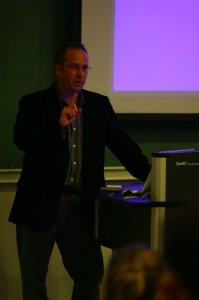
Katie Armes
Review staff writer
Michael P. Nelson discussed the importance of interdisciplinary work and the reliability of short-term studies in the Isle Royale project during his first lecture about environmental ethics May 4.
The Isle Royale project, now 50 years old, studied the relationship between moose and wolves on the island in Lake Superior.
Nelson, associate professor of environmental ethics and philosophy at Michigan State University, presented his beliefs about the relationship between a society’s worldview and its environmental ethics, as seen in the Ojibwa Native American tribe May 5.
Professor Marv Henberg, philosophy department chair, has an interest in environmental ethics and has contributed to one of Nelson’s books. Henberg will be leaving Linfield for a new position as the president of the College of Idaho in the fall.
“This is kind of my swan song at Linfield,” Henberg said. “I thought I could scratch my own itch for once.”
The populations of wolves and moose on Isle Royale are measured each winter. While ecologists expect populations of predators and their prey to follow the Lotka-Volterra model, where the predator population reaches its peak soon after the prey population starts to fall, the pattern isn’t clearly discernible on Isle Royale after the first five years of observation. Nelson said.
“This is the longest study of a predator-prey relationship in the world,” Nelson said. “We don’t have studies like this. We don’t pay attention to things this long.”
The wolves’ kill rates are also hard to predict. While short-term studies would indicate a constant rate, nearly 50 years of data collection reveal that the number of kills per wolf vary widely and depend on several factors.
“The short view of nature would kind of trick us,”
Nelson said.
As the Isle Royale team ethicist, Nelson also presented the option of genetically rescuing the wolves on the island. The wolves all descended from one female and only one or two males and are severely inbred.
Bringing in new wolves to allow some genetic variation is a controversial idea that has been opened for public discussion.
While Nelson’s first lecture focused on one specific study, his second, presented May 6, explained more generally how to determine if a society has a good environmental ethics.
The most common method to determine a community’s ethics is to observe its actions.
“I don’t think that I glimpse your moral commitment by stalking you for two weeks,” Nelson said.
Nelson proposed that a society’s worldview determines its environmental
ethics.
By reading stories and accounts of the Ojibwa tribe, Nelson determined that the Native Americans have an inclusive worldview, leading to their care for the
environment.
“Even really intimate relationships like marriage can exist between the human and non-human world,” Nelson said, “Everything has constant, familial references.”
The Ojibwas’ worldview didn’t necessarily prevent them from negatively effecting their environment, but it does demonstrate that they recognized the value of nature. The popular method, Nelson said, makes the mistake of equating ethics with actions, ignoring the importance of intentions.
Nelson said he believes America is confused about its environmental ethics.
“Our problem is not merely our actions, but our fundamental relationship with the world,” Nelson said.






